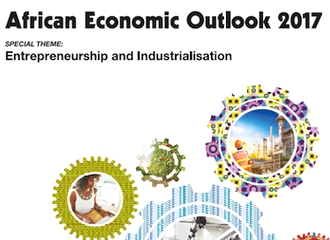The new African Economic Outlook is released
Submitted by admin on Wed, 05/31/2017 - 10:45
The African Economic Outlook 2017, co-authored by the OECD, the African Bank of Development and the UNDP, presents the continent’s current state of affairs and forecasts its situation for the coming two years. This annual report examines Africa’s performance in crucial areas: macroeconomics, external financial flows and tax revenues, trade policies and regional integration, human development, and governance.
For its 16th edition, the report focuses on the role of entrepreneurs in Africa’s industrialization process. It proposes practical steps that African governments can take to carry out effective industrialization strategies. Policies aimed at improving skills, business clusters and financing could remove important constraints on African private enterprises.
The report emphasizes the importance of SMEs in Africa’s development. As recalled by Abdoulaye Mar Dieye, Regional Director for Africa at the United Nations Development, “The key to successful development in Africa is to nurture the emerging culture of entrepreneurship; a path that can unleash high-octane creativity and transform opportunities into phenomenal realizations”
Main findings
• Africa’s growth increasingly relies on domestic sources, as shown by dynamic private and government consumption that combined, accounted for 60% of growth in 2016. This growth also coincides with progress in human development: 18 African countries had achieved medium to high levels of human development by 2015.
• Still, progress remains uneven. African governments need to push their agenda for job creation with more ambitious and tailored policies. Demands for better employment opportunities are the main reason behind continued public protests, having motivated a third of all public demonstrations between 2014 and 2016. With the size of the workforce likely to increase by 910 million between 2010 and 2050, creating more and better jobs will remain the core challenge for African policy-makers.
• Despite a decade of progress, 54% of the population in 46 African countries are still trapped in poverty across multiple dimensions – health, education and living standards.
• To turn the challenge of higher population growth into an opportunity, making Africa’s new industrial revolution successful is paramount. Twenty-six African countries today have an industrialisation strategy in place. But most of these strategies tend to emphasise the role of large manufacturing companies at the expense of entrepreneurs in sectors with the potential for high growth and employment creation, including start-ups and small and medium-sized firms. Businesses with fewer than 20 employees and less than five years’ experience provide the bulk of jobs in Africa’s formal sector
